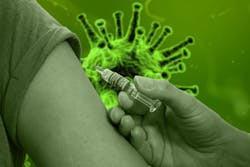Moderna receives FDA Fast Track designation for SARS-CoV-2 vaccine candidate
Moderna announced that the U.S. Food and Drug Administration (FDA) has granted Fast Track designation for the Company’s mRNA vaccine candidate (mRNA-1273) against the novel coronavirus (SARS-CoV-2), according to a press release from the company.
Fast Track is designed to facilitate the development and expedite the review of therapies and vaccines for serious conditions and fill an unmet medical need.
In the Phase 1 study of mRNA-1273, the first participant was dosed on March 16. The National Institute of Allergy and Infectious Diseases (NIAID) is leading the Phase 1 study, which has completed enrollment of 45 healthy adult volunteers ages 18 to 55 years in three dose cohorts (25 µg, 100 µg and 250 µg). The NIH recently amended the Phase 1 protocol to include an additional six cohorts: three cohorts of older adults (ages 56 -70) and three cohorts of elderly adults (age 71 and above).
Funding of $483 million from the Biomedical Advanced Research and Development Authority (BARDA), a division of the Office of the Assistant Secretary for Preparedness and Response (ASPR) within the U.S. Department of Health and Human Services (HHS), supported the planning for these studies and will also support the late-stage clinical development programs, as well as the scale-up of mRNA-1273 manufacturing both at Moderna’s facilities and that of its strategic collaborator, Lonza Ltd.
For the Phase 2 study, Moderna plans to enroll 600 healthy participants across two cohorts of adults ages 18-55 years (n=300) and older adults ages 55 years and above (n=300). Each participant will be assigned to receive placebo, a 50 μg or a 250 μg dose at both vaccinations, which will be scheduled 28 days apart. Participants will be followed through 12 months after the second vaccination.
Moderna is finalizing the protocol for a Phase 3 study, which it expects to begin in early summer of 2020.

